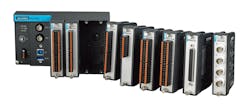Advantech Launches New iDAQ Modular DAQ Series Targeting the Test and Measurement Market
The test and measurement market has been rapidly evolving, trying to keep up with fast growing technologies such as electric vehicles, 5G communications, and EV batteries that create the need for new test requirements. In response, Advantech has released a new series of data acquisition modules—iDAQ series. The iDAQ series is a new series of modular DAQ modules and chassis including the iDAQ-900 series chassis and iDAQ-700 and 800 series DAQ modules.
Modular design, good flexibility
The iDAQ series splits traditional functions in PCI/PCIe cards and USB modules into several smaller functional units. Unlike traditional multi-function cards with I/O and functions that are fixed, each iDAQ module only has one type of function, like a digital input, analog input, or even IEPE input. Customers can choose different module combinations and specifications for their iDAQ system to meet different test and measurement scenarios.
iDAQ modules are hot-swappable, which makes maintenance very simple. When an iDAQ module is integrated in a machine used as a measurement device, it will cumulatively incur damage after long periods of constant use. Hot swapping is used to replace a damaged module without interrupting its operation, avoiding the nuisance of shutting down and then restarting critical equipment such as servers which need to be continuously running. Also, in laboratory scenarios, measurement signal types can vary from test program to test program according actual needs, so a DAQ system hot-swap features is very helpful for lab technicians to swap modules according to project requirements.
Precise timing synchronization and simplified wiring
iDAQ-900 series chassis provides fast bus access on the backplane to connect iDAQ modules. There are triggers and pacer clocks in the timing signals which control when the measurement cycle will start and stop, as well as the acquisition speed. Each of the DAQ modules can be synchronized together using the same clock and trigger event via the bus. This makes synchronization easy with Advantech iDAQ systems because they only need to be configured in the software, which also means no complicated wiring.
On top of the backplane bus, programmable function pins (PFP) in the iDAQ-900 chassis provide an interface for timing control. The DAQ modules can be configured as either input or output signal types, and as either single pulse or clock types. This provides great flexibility for field applications needing to synchronize with external devices, or to be triggered by other devices simply with pulses.
Ruggedized design against bad environments
Three factors make iDAQ system rugged: anti-vibration, EMC immunity, wide-range temperature operation. The whole assembly is tested under 5Grms random vibration and 30G shock tests that are designed to survive the most extreme vibration scenarios. The iDAQ series uses an aluminum alloy as its enclosure, which provides better EMC performance. Finally, the operating temperature range is -20 to 60°C, which will make it well adapted to not only most factories, but many outdoor environments. The iDAQ system is designed to stand up to and operate 24/7 in most factory and outdoor environments.
Multiple interfaces, one SDK
The iDAQ-900 chassis provides different connectivity solution depending on which module is installed. For example, the iDAQ-934 is a USB 3.0 chassis with 4 iDAQ slots and the iDAQ-964 is a chassis expansion of AMAX edge controllers.
The iDAQ system relies on the DAQNavi/SDK as a development package. It provides a Navigator utility to configure the module and chassis, and test its functionalities. Example codes are provided to help guide programmers in how to use the API suite. In addition, Advantech also released a Python SDK so customers can quickly build a test their solution and prove its reliability.
The programming code for iDAQ systems are inter-changeable among chassis. For example, the programs completed based on iDAQ-934 can be moved to iDAQ-964 directly with only slight modification on device names. With its modular and rugged design, simplified wiring and ease-of-use SDK, the Advantech iDAQ system will be an ideal choice for test and measurement scenarios that will need to face future DAQ testing challenges.

